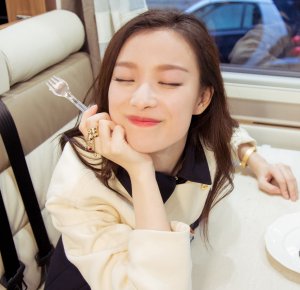
With the popularity of "A Love So Beautiful", I see a lot of people hoping to find a similar drama to fill the void now that it has ended. There are similarities in the two dramas in the sense that they are set in high school for a majority of the run time and take place during the same time period. However, outside of those similarities, the two dramas set out to fulfill different purposes. With "A Love So Beautiful," I feel that it is a love story first and foremost and the life of a student is given secondary focus but "With You" focuses more on a student's life and how those formative years in high school set the foundation on who we become as we grow older. Of course, love is one of the things that students first start to experience in high school but that is just one of the many items that preoccupy a student's time.
For instance, this drama also looked at how students are tasked with huge responsibility at a young age to make a choice that can very well affect the rest of their lives, deciding to focus on liberal arts or STEM. However, instead of leaning one way, it is implied that one should do their best to be well versed in both in order to be a well rounded individual. We come across many different characters (students, teachers and parents) throughout this drama, each with their own hopes, desires, fears and dreams. And just like in real life, they will come and go but there will be those that leave an impression on you or impact you in some way.
What I also liked about this drama is how helpful and supportive everyone was to one another whether they were friends or "only" classmates. There was a real sense that high school is just one of many stops in your life and how it prepares you to learn and grow throughout life.
Next, I will speak about the Romance portion of this drama which is what I think most people are curious about. And once again I will speak on this in relation to ALSB. In ALSB there are more displays of physical affection and because in that drama they have known each other since childhood they are more comfortable with one another right from the start of the drama. However, in "With You," I enjoyed seeing Yu Hai and Geng Geng's relationship develop over time especially with the way they got off on the wrong foot in their initial encounter. It's not to say one drama is better than the other in the way they portray love but that they portray different forms of love. In "With You," I feel that the writer wanted to portray how blissful it is to simply be together with the person you like/love. Whether that means being "desk buddies" and helping each other with math/physics problems or playing video games together. No matter what the activity/event was, as long as they were able to do it together, made it all worthwhile. Similarly, both characters had their own strengths and weaknesses and complemented each other well and were each other's pillar of support when they needed it. This drama is not really about the grand gestures (at least in Yu Hai's case) but about the little ones. For instance, risking the chance of incurring a strict teacher's wrath by asking him to repeat his explanation of a problem that you already understand because you notice that the person you like is having a difficult time catching up but is too afraid to ask.
Ultimately, if you're looking for a drama replacement for ALSB, I suggest you look elsewhere. However, if you're looking for a drama that primarily focuses on youth/school and the growing pains associated with that time period of our lives, I think you would be hard pressed to find a better one than this one.
Was this review helpful to you?
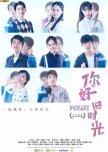
I was eager to see what the other classes at Zhen Hua High School were up to. At the beginning of the drama, we are introduced to a large roster of new characters and I have to admit initially I was a bit worried that they bit off more than they could chew. However, I should have known better than to doubt this production team.
What I love most about both "With You" and "My Huckleberry Friends" is the attention and time they afford to each character whether main or supporting. As the drama says, every person is the main lead of their own story. That means all the characters will experience highs and lows. No matter how "big" or "small" the issue, all of their problems were treated with the respect they deserved. As a result, even when characters that weren't featured heavily throughout the drama had a moment of success/triumph, I couldn't help but be moved as well. Similarly, some characters also experienced setbacks and failures and I was able to sympathize with them. But these hardships/struggles also serve as learning experiences so that we can better ourselves. No one can predict if our past struggles will net us the result we want in the end. However, in the process, we will become better versions of ourselves with fond memories that we can look back on. As a result, we should cherish our past not mourn it.
I also like how Zhen Hua feels like a community made up of individuals that genuinely care about one another. Even though Zhen Hua is an elite school, students go out of their way to help each other if they see someone is struggling even if that means a student might surpass them in ranking. The students try to be inclusive and take notice of each other's strengths in order to help each other achieve their dreams. Sometimes we forget that school isn't just about learning different subjects/earning grades but also learning how to socialize/interact with people who may have different personalities, interests, dreams and so on. Ideally, you shouldn't have to choose a major/university only because you think you'll get a good job from it and your job/career shouldn't solely define who you are as a person. Instead, you should be able to pursue something that genuinely interests you so that you'll be more invested in what you're learning. Unfortunately, this isn't a realistic option for most people. But there will be a courageous (and lucky) few who will buck the trend and go after their dreams however impossible they may seem because when you're young, the possibilities of what you can be seem endless.
One of the main messages that both "With You" and "My Huckleberry Friends" promotes is being yourself. This also means discovering who you are in the process. For some people, high school is the time when you start to think about your place in society and how you'll contribute to it. Some of the characters in both dramas, select their majors because their friends/crush have chosen that major or have been pushed into choosing it by their parents. It's important to explore a variety of options to find what suits you the most. That is how you'll contribute to society but your interactions with other students/teachers/parents and how you conduct yourselves will determine who you are as a person. If you want other students to be more kind, to be more understanding/empathetic, you should lead by example. Be the change you want to see. I think it's great that the teachers are portrayed encouraging this type of behavior and that they understand the youth are the future.
One of the main differences between "With You" and "My Huckleberry Friends" is the greater emphasis placed on the students life outside of the school's walls in MHF and how those factors inform what kind of student they are at school. Social status, high expectations from parents, personal trauma are just some of the issues that are examined in this drama. We also see the students bond over shared interests such as Anime/manga, basketball, music, movies as a way for them to relieve their stress and temporarily escape the harshness of their current realities. Those interests will bring them together but their shared experiences will bond them for a lifetime.
Honestly, if I had to choose between "With You" and "My Huckleberry Friends", I wouldn't be able to. I feel that they both complement one another so well and together should be counted as one of the definitive representations of youth and the growing pains associated with it.
Was this review helpful to you?
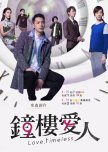
Another thing I liked about this drama was the little details the writer gave that make the world feel more lived-in. Without spoiling much, there is an early episode where the characters are told a story about a ghost haunting a building. Although, played for laughs, this story later plays a somewhat important part to the main story. It's little details like this and others that eventually add up and have repercussions on the characters and their decisions and actions so you'll get more out of this drama if you pay attention to all the fine details. Beyond the theme of love, this drama also touches on the subject of regrets/second chances, independence/freedom and fate/locus of control.
The main four leads varied from good-great with Summer Meng and Huang Wei Ting being the standouts to me. Summer Meng and Nick Chou should be commended for selling the fact that they were close friends with a shared history together. The glances the two shared as the other pursued other love interests definitely were effective in portraying the love they had for one another. Johnny Yang and Blue Lan were also good in supporting roles that provided some levity during some of the more "serious" moments.
The OST was great with Let Go, My Turn to Love and Could Still Embrace standing out for me. There were some technical/sound mixing issues when songs were used sometimes but that is a minor nitpick.
I would definitely rewatch this drama as many of themes touched upon in this drama are right up my alley and I became invested in watching these characters change and grow. Ultimately, I felt like this drama set out to explore the theme of love, which means showing both the joy you get out of it and also the pain it can also bring. How we learn to endure the pain part of it makes the joy part of it that much better. For my money's worth, the drama succeeded in conveying this while also tackling other themes to great effect. As a result, I believe this is one of the more overlooked dramas of 2017 and feel it deserves your attention and time if you want a drama that has loftier ambitions than simply who the characters will end up with.
Was this review helpful to you?
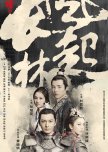
Nirvana in Fire Season 2: The Wind Blows in Chang Lin
11 people found this review helpful
One of the interesting themes this drama examines is the collision between tradition and modernity. It is clear that the times are indeed changing throughout the kingdom and country. Many of the characters that will soon wield a great deal of power are young in age. In response to this, a lot of the adult characters seem reluctant to relinquish their power and do no trust that the youth are equipped to lead. Some of the adult characters even have no issue in manipulating the younger characters for their own personal petty reasons.
On the other hand, you had characters like Pingjing and Feizhan who were free to and encouraged to explore life outside the palace to acquire new knowledge/perspective. Similarly, there's an acknowledgement that women in particular lived harsh lives within the palace. Often, they had their lives set out for them with no say in the manner. Girls as young as 12 were sold and expected to be servants. It is expected that women put their fathers/husbands first and live to serve them. However, there are characters like Qian Xue who is a formidable fighter in her own right and has a husband who accepts that she may be an outlier but loves her all the same. There's also Lin Xi, who has her own aspirations and hopes to make a positive contribution to the world even if it's not ready to accept them from a woman.
Even though I empathized with Mei Changsu, I also liked following the journey of a more "human" character like Pingjing. In the beginning of the drama, we meet Pingjing as he is living his life carefree at Langya Mountain. A world away from what awaits him if he has to follow in his father/brother's footsteps and assumes his role in the Chang Lin Army which is more strict and rigid. It takes him a long time to adjust and he is constantly reprimanded by his father and brother but it's necessary because what he is fighting for is bigger than him. Above all us, I appreciated the fact that Pingjing just wanted the option of being able to choose to live his life the way he wanted to. Much like how the two main characters are strong in their own right but also having overlapping qualities, the two dramas should be appreciated on their own merits. If you go with wherever the wind takes you, especially if it takes you to Chang Lin (sorry), you'll be rewarded with what I consider to be one of the best dramas.
Was this review helpful to you?
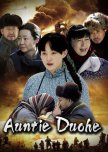
This drama picks up at the conclusion of the Second Sino-Japanese War. Those that survived the war are trying their best to get on with their lives and hoping for a bit of normalcy to return to their lives. Anyone with even a cursory bit of knowledge in regards to China and Japan's relations, knows that their relationship was extremely tense/strained during this time period and that's probably putting it lightly. So you can imagine the scenario when a Chinese family rescues a Japanese and welcomes her into their family. Duohe and the Chinese family have both lost family members as a direct result of the war and it would be understandable if they held onto deep resentment towards one another because of that. Instead, everyone acknowledges that even though it was Japan that invaded China, innocent civilians from both countries suffered greatly because of the war. With that in mind, the involved parties, try their best to coexist peacefully with another. I liked that even though China and Japan have their own distinct cultures, customs and traditions, the drama never portrayed the differences as being bad and Duohe only needed to appear more "Chinese" in order to blend in so that other people would't find out.
Without spoiling anything, Duohe's arrival into the family and her place in the family brings its own set of baggage. Baggage that entails a lot of complex, contradicting and conflicting emotions. Her presence in the family is certainly a complicated one but over the course of the drama we gradually see their relationship and bond grow as they endure and persevere through many hardships. The overwhelming amount of understanding, empathy and compassion shown throughout this drama was really touching to me.
The acting was amazing by the entire cast but I have to single out Sun Li's performance. This was the first drama I had watched with Sun Li and she certainly made a huge impression on me solely with her eyes. When she first enters the family, Duohe's eyes look on with curiosity and horror as she sees Erhe's father hitting him, wondering why a parent would hit their own child. Later on, her eyes express great sorrow as she recounts how she lost her family members. Despite everything she has gone though, there is also kindness in her eyes. Duohe believes in the goodness of humanity because Erhe's family saves her and sees her as part of the family despite the fact that she is Japanese/not related by blood. She also witnesses countless amount of people offering help and support even if the situation is risky or they won't receive any benefits from doing so. They do so because they are helping out a member of their community, a fellow countrymen, a fellow human being. A little bit of kindness goes a long way.
Was this review helpful to you?
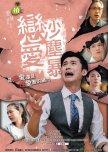
Despite running only seven episodes, I felt that all the family members were given the appropriate amount of focus for their character arcs to be fully realized. Sometimes you might find yourself wishing for one character's scenes/arc to be finished to move on to another one but in this drama I never felt that way. I was equally invested in each of the character's lives and was anxious to see how they would sort out their problems.
However, one of the greatest strengths of this drama is its offbeat sense of humor. This drama deals with common issues such as finding purpose in one's life, infidelity, first loves/making a connection with another person and injects its own brand of offbeat humor to it that made it all very refreshing.
Also, any drama that features characters bonding over their shared love for great Japanese directors such as Kurosawa, Ozu, Mizoguchi and Oshima is a win in my book.
The cast features both seasoned actors and fresh faced actors with no prior acting experience but they were all uniformly excellent. Special shout-out to Sakuraba Nanami and her Mandarin skills and to Esther Yeh. In the latter's case, her character could be seen as annoying in less capable hands but she was a scene stealer for me and couldn't help but laugh at her interactions with Chris Wu and the rest of the family members.
I have to thank this drama for introducing me to One Ok Rock and really like how "Wherever You Are" was used throughout the drama.
At only seven episodes, you don't have to invest a lot of time with this one but if you're able to get on this drama's wavelength and enjoy a little wacky humor with your family dramas then I believe you will be rewarded with a gem of a drama.
Was this review helpful to you?

What I liked about this drama was how Tientsin itself feels like a character and this is a credit to the attention to detail in regards to the production/set design. Just as the characters may be of afraid of what dangers may be lurking in the water, there are also dangers hiding in the shadows of Tientsin. Throughout the drama, we are taken to seedy areas such as a brothel, prison and even a literal black market. It is assumed that since Tientsin is a coastal city, it is isolated from the outside world. As a result, they have developed their own customs, culture, traditions and superstitions that they strongly believe in that are free from any outside influence. However, in more recent times, with the development of ports and canal system, outside/foreign influences are starting to seep in. It was certainly interesting to see how characters that never left Tientsin and those that were educated abroad/experience with the outside world collided and came together in solving the mystery.
Speaking of the characters, Tientsin Mystic has assembled an interesting group of them. I briefly read up on Taoism (Read: skimmed the Wikipedia page) and learned that women shamans play an important part in Taoism. I think the reaction to Gu Ying may be mixed, some may find her annoying but I liked what her character brought to the drama. We're given the reason as to why she constantly follows around Guo De You but she also plays a role beyond merely being a love interest for his character. It was interesting to see the rituals/practices that Gu Ying and her mother engaged in. More than that, I really enjoyed the character of Xiao Lan Lan and the similarities she shared with Dao Ming. Both have prominent family backgrounds but are trying to break free from the roles prescribed to them. The drama also deals with cults and brainwashing. Xiao Lan Lan works as a newspaper reporter and even though her father is the Secretary-General with influence over Tientsin which includes the newspaper (manipulating the information so as to not cause panic amongst the people), Xiao Lan Lan remains committed to finding the truth.
Beyond all that, the drama is just a lot of fun despite dealing with some dark subject matter at times. The drama mixes a variety of elements such as: supernatural/mysticism, action (there are some great setpieces that take place in the hospital/prison), romance, comedy, mystery all with its own distinct touch. Fair warning, the drama does end on a cliffhanger but unlike other Chinese dramas that have done the same, this one does have a confirmed second season. Credit and admiration goes to the production team for rendering Tientsin and this world so vividly, a world that I would be happy to return to.
Was this review helpful to you?

